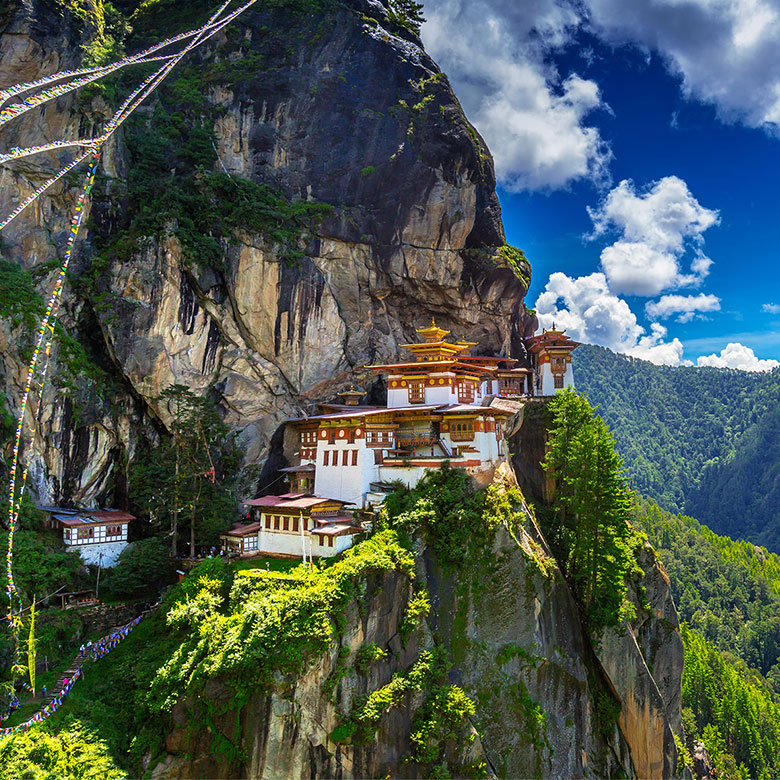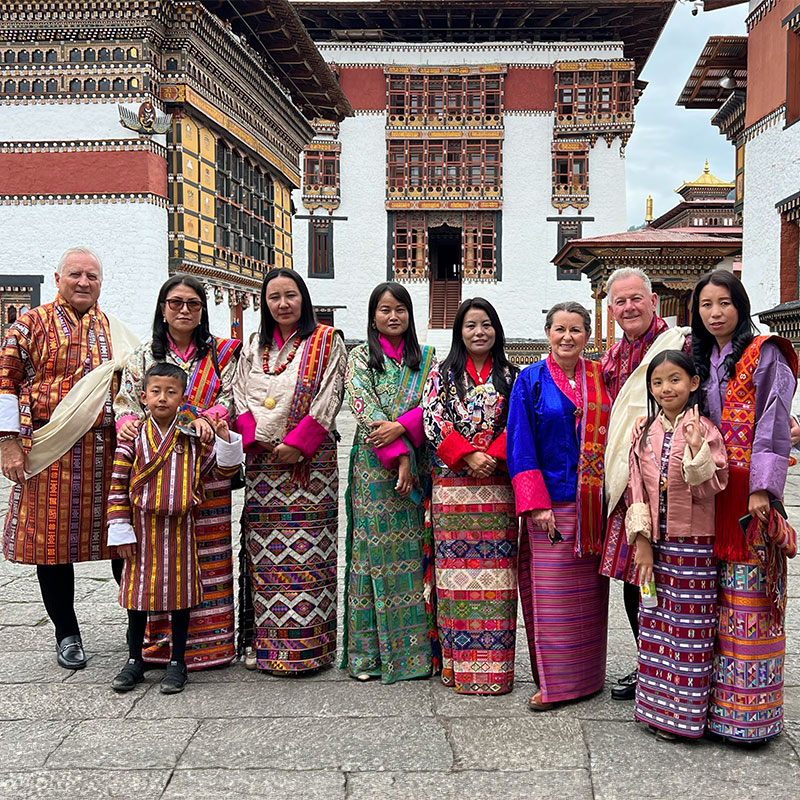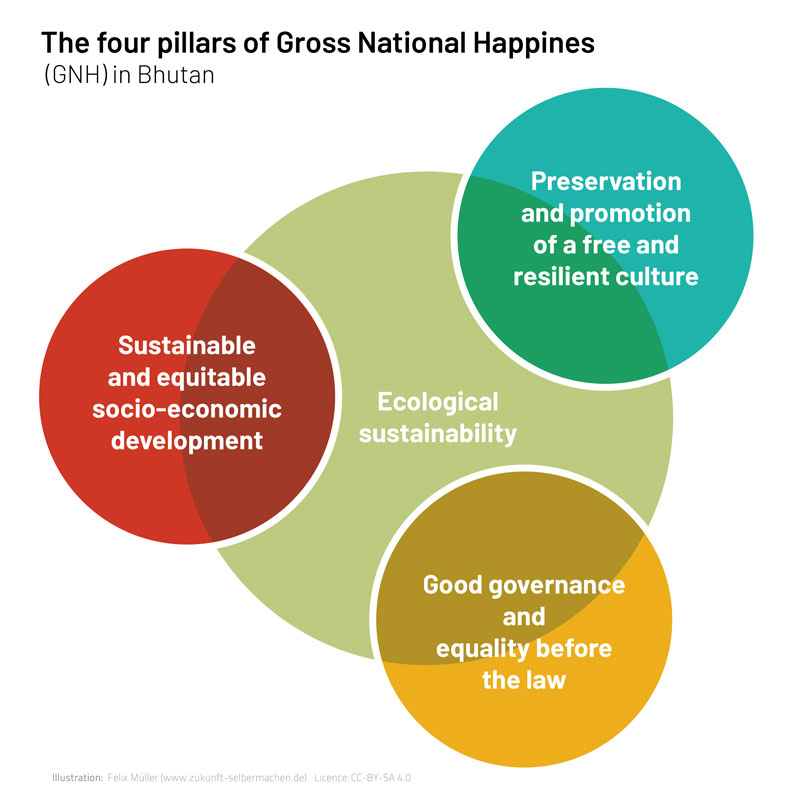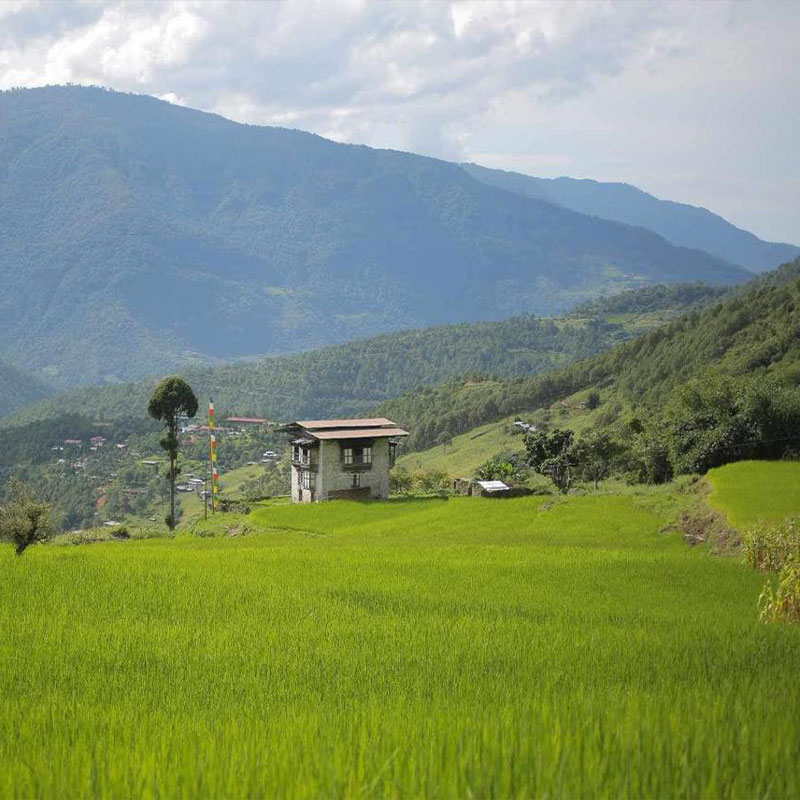About Bhutan
History
Bhutan's history is a tapestry woven with threads of spirituality, governance, and evolution. It traces its roots back to the 8th century when Guru Padmasambhava, the revered Buddhist master, brought Tantric Mahayana Buddhism to the land, marking the beginning of Bhutan's spiritual journey.
Fast forward to the 17th century, Zhabdrung Ngawang Namgyal emerges as a unifying figure, establishing a dual system of government that harmonized secular and religious authority. His visionary leadership laid the groundwork for Bhutan's distinctive blend of tradition and governance, exemplified by the construction of formidable dzongs that served as both administrative centers and religious sanctuaries.
In 1907, Bhutan witnessed the dawn of monarchy when Sir Ugyen Wangchuck ascended to the throne as the first King of Bhutan, establishing a hereditary monarchy that brought stability and continuity to the kingdom. Yet, Bhutan's story didn't end there. In 2008, against the backdrop of its centenary, Bhutan embraced constitutional monarchy, marking a historic transition towards democratic governance. With the adoption of a new constitution and the holding of its first general elections, Bhutan embarked on a new chapter in its history, reaffirming its commitment to progress while cherishing its timeless cultural heritage.


Religion in Bhutan
Religion in Bhutan serves as the spiritual bedrock of society, permeating every aspect of daily life with its profound teachings and rituals. Buddhism, particularly the Drukpa Kagyu and Nyingma schools, holds sway as the predominant faith, shaping the cultural landscape and influencing governance since its introduction in the 8th century. Monasteries, stupas, and prayer flags dot the serene countryside, serving as tangible expressions of devotion and reminders of the spiritual path.
Alongside Buddhism, a minority of Bhutanese practice Hinduism, primarily in the southern regions, adding to the religious tapestry of the nation. The government of Bhutan upholds religious freedom and supports the preservation of sacred sites and traditions, fostering a harmonious coexistence of diverse faiths. In Bhutan, religion is not merely a set of beliefs; it is a way of life, imbuing every moment with meaning, reverence, and a profound sense of interconnectedness with the cosmos.
Cultural Heritage
The cultural heritage of Bhutan is a treasure trove of tradition, spirituality, and vibrant customs that have thrived in the heart of the Himalayas for centuries. Rooted deeply in Buddhism, Bhutan's cultural fabric is adorned with majestic dzongs, intricate temple architecture, and colorful festivals that celebrate the country's rich spiritual legacy. From the sacred monasteries perched atop rugged cliffs to the serene prayer flags fluttering in the mountain breeze, every aspect of Bhutanese culture reflects a deep reverence for nature and a profound connection to the divine.
Traditional arts and crafts, such as thangka painting, intricate woodcarving, and elaborate textile weaving, are meticulously preserved and passed down through generations, serving as both expressions of artistic excellence and embodiments of cultural identity. Through its vibrant festivals, ancient rituals, and enduring customs, Bhutan continues to safeguard its cultural heritage as a source of pride, inspiration, and spiritual nourishment for generations to come.


Traditional Dress
The traditional dress of Bhutan, known as the "gho" for men and the "kira" for women, is not just attire but a symbol of cultural identity and pride. The gho, worn by Bhutanese men, is a knee-length robe tied at the waist with a cloth belt known as a "kera." Often crafted from handwoven Bhutanese fabric, the gho is adorned with intricate embroidery and decorative motifs, symbolizing the wearer's heritage and personal style.
The kira, worn by Bhutanese women, is an elegant and intricately woven garment consisting of a long, rectangular piece of fabric draped around the body and fastened at the shoulders with a brooch or pin accompanied by light outer jacket known as a Tego with the inner layer known as a Wonju. The kira is often embellished with intricate patterns and designs that reflect the wearer's social status, region, and occasion.
Worn on formal occasions and in daily life, these traditional dress of Bhutan not only showcases the country's rich textile heritage but also represents its commitment to preserving unique cultural traditions.
Wellness and Spa
Bhutanese wellness, spa, and retreat experiences offer a harmonious blend of ancient wisdom and serene natural surroundings, making them truly unique. Nestled amidst the breathtaking landscapes of the Himalayas, these retreats emphasize holistic healing and rejuvenation of both body and spirit. Traditional Bhutanese therapies, such as hot stone baths infused with medicinal herbs, and massages that incorporate local techniques, provide deep relaxation and therapeutic benefits. The serene environment, often found in remote and peaceful settings, encourages introspection and mindfulness, allowing visitors to unwind and reconnect with themselves. Whether surrounded by mist-covered mountains or nestled in verdant valleys, Bhutanese wellness retreats offer a tranquil escape where one can find inner peace and restore balance to life.


Bhutanese cuisine
Bhutanese cuisine reflects a deep connection to the country's pristine environment and commitment to organic practices. Known for its simplicity and reliance on locally sourced ingredients, Bhutanese food celebrates the rich flavors of Himalayan herbs, grains, and vegetables. Organic farming is a cornerstone of Bhutanese agriculture, with farmers embracing traditional methods that eschew chemical pesticides and fertilizers. This dedication to organic cultivation ensures that every dish is not only delicious but also wholesome and nourishing. Staples like red rice, buckwheat, and maize are complemented by a variety of fresh greens, mushrooms, and hearty stews, often flavored with Bhutanese red chilies for a hint of spiciness. Dining in Bhutan offers a true farm-to-table experience, where each meal is a testament to the country's commitment to sustainability and the preservation of its natural bounty.
Gross National Happiness
Gross National Happiness (GNH) is a holistic development philosophy and framework introduced by the Fourth King of Bhutan, Jigme Singye Wangchuck, in the 1970s. Unlike Gross Domestic Product (GDP), which measures economic output, GNH seeks to evaluate the well-being and happiness of a nation's citizens.
GNH rests on four pillars: Promotion of Sustainable Development, Preservation and Promotion of Cultural Values, Conservation of the Natural Environment, and Establishment of Good Governance. Bhutan uses GNH as a guiding principle in policymaking and development planning, aiming to create conditions that promote the happiness and well-being of its people while preserving its unique cultural heritage and natural environment.
By prioritizing GNH, Bhutan has become a global beacon for sustainable development, inspiring nations worldwide to rethink their approach to progress and prioritize the well-being of their citizens above all else.


First Carbon-negative Country
Bhutan's remarkable commitment to environmental sustainability has earned it the distinction of being the first carbon-negative country in the world. Despite its small size, Bhutan has made significant strides in combating climate change by preserving its pristine forests and embracing renewable energy initiatives. The kingdom's lush forests, which cover over 70% of its land area, serve as a vital carbon sink, absorbing more carbon dioxide than its emissions produce.
Bhutan's dedication to preserving its natural heritage is exemplified by its constitution, which mandates that at least 60% of the country must remain forested for all time. Additionally, Bhutan has prioritized hydropower development as a clean energy source, further reducing its carbon footprint and contributing to its carbon-negative status. Through its unwavering commitment to environmental stewardship, Bhutan sets an inspiring example for the global community, demonstrating that sustainable development is not only achievable but essential for safeguarding the planet for future generations.
Flora and Fauna
Bhutan's lush and diverse ecosystems are home to a rich array of flora and fauna, reflecting the kingdom's commitment to environmental conservation and biodiversity. The country's rugged terrain, ranging from subtropical forests in the south to alpine meadows in the north, provides habitat for a remarkable variety of plant and animal species.
Bhutan boasts over 5,000 species of vascular plants, including rare orchids, rhododendrons, and medicinal herbs prized in traditional Bhutanese medicine. Its dense forests are teeming with wildlife, including endangered species such as the Bengal tiger, snow leopard, and black-necked crane, as well as elusive creatures like the takin, Bhutan's national animal.
With over 700 species of birds, including the critically endangered White-Bellied Heron and the majestic Himalayan monal and, Bhutan is a paradise for birdwatchers. The kingdom's commitment to environmental stewardship, exemplified by its extensive protected areas and sustainable land management practices, ensures the preservation of its unique flora and fauna for future generations to enjoy.


Sustainable Tourism
Bhutan's approach to sustainable tourism is a shining example of environmental stewardship and cultural preservation. Guided by the principles of Gross National Happiness (GNH), the kingdom prioritizes high-value, low-impact tourism, ensuring that visitors experience the country's natural beauty and vibrant culture while minimizing negative impacts on the environment and local communities.
Bhutan's unique tourism policy includes a daily tourist tariff, which covers accommodation, meals, transportation, and a sustainable development fee. This tariff not only helps regulate tourist numbers but also generates revenue for conservation efforts and community development projects. Additionally, Bhutan promotes responsible travel practices, such as waste management, energy conservation, and respect for local customs and traditions.
The country's commitment to sustainable tourism ensures that future generations can continue to enjoy Bhutan's pristine landscapes, rich biodiversity, and unique cultural heritage for years to come.